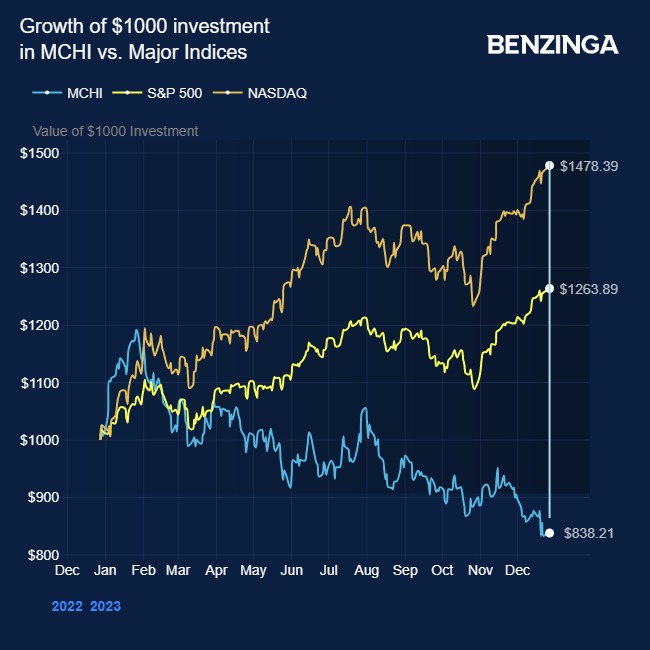Zinger Key Points
- Shorting China has become an overcrowded trade in 2023 fund managers say.
- PBoC says it is committed to supporting growth, despite becoming increasingly sidelined.
- Get 5 stock picks identified before their biggest breakouts, identified by the same system that spotted Insmed, Sprouts, and Uber before their 20%+ gains.
Nearly 90% of the foreign investment inflows into Chinese equity markets in 2023 has been withdrawn as sentiment crumbles amid concerns over the country’s growth trajectory and the impact of losses from the real estate sector.
Data gathered from Hong Kong Stock Connect and interpreted by the Financial Times, showed that since peaking at $33 billion in August, net foreign investment in China-listed shares has dropped 87% to just $4.3 billion.
China stock indices have had a tough year as growth concerns have built despite efforts by the People’s Bank of China to boost confidence in the financial system.
The Shanghai Composite is down 4.4% over the year, while the China A50 index has slumped 12% and the Hang Seng has fallen nearly 14%.
Meanwhile, the heaviest-weighted exchange traded funds that track China shares are down by similar amounts: BlackRock’s iShares MSCI China EFT MCHI is down 13.8% year to date, while iShares China Large-Cap ETF FXI is down 15.4% over the year.

Also Read: Goldilocks 2024: Investors Increasingly Optimistic On Profits Outlook For Next Year
Investors Losing Confidence In Major Institutions
While the People’s Bank has tried to maintain its efforts at making China an attractive opportunity for foreign investment, the central bank is increasingly at odds with the central government.
Having made steps to align itself more closely with foreign central banks, including the Federal Reserve and European Central Bank, under the governorship of Zhou Xiaochuan between 2002-2017, the PBoC has become increasingly sidelined since the Covid pandemic.
Since March, the central government has put the PBoC under the control of the Central Financial Commission, a party-led oversight body.
At its monetary policy meeting on Thursday, the central bank said it would step up efforts to support the economy, maintaining ample liquidity in the financial system and guide credit growth and the development of the ailing real estate market.
Much of China’s current equity market woes are due to ongoing fragility in the country’s property sector. Around 30% of fund managers polled by Bank of America said in the December Fund Manager Survey that China’s real estate sector was now the most likely source for a systemic credit event.
The survey also showed that short-selling — betting on further equity market losses — on Chinese equities had become such a popular trade that 20% of fund managers saw it as the “most-crowded” trade in December.
China ETFs Also Feel The Strain
Meanwhile, exchange traded fund flow data compiled by Lipper showed that in November, the Asia Pacific region was among the worst performing as frictions in China persisted. Net inflows for the A-Pac region were just $5.15 billion, compared with $104 billion for North America and $19 billion for Europe.
“Even as China seems to be back on track after re-opening its economy, there are still some frictions, especially in the real estate sector,”said Detlef Glow, head of Lipper EMEA research.
New York-listed China stocks have been poor performers this year also.
Tim Seymour, founder and CIO at Seymour Asset Management has been an investor in international companies for many years, but has become cautious on China where, he says, sentiment is as low as he's ever seen it.
Interviewed by Benzinga last week, Seymour said: “Think about Tencent TCEHY and Alibaba BABA — the pressure is coming from within and not with U.S. investors, and this is part of the problem.”
Tencent American Depository Receipts have fallen 13.6% this year, while those of Alibaba are down nearly 14%.
Now Read: Find Value In Large Multinationals And Catch The Dividend Yield, Says Tim Seymour
Photo: Shutterstock
© 2025 Benzinga.com. Benzinga does not provide investment advice. All rights reserved.
Trade confidently with insights and alerts from analyst ratings, free reports and breaking news that affects the stocks you care about.